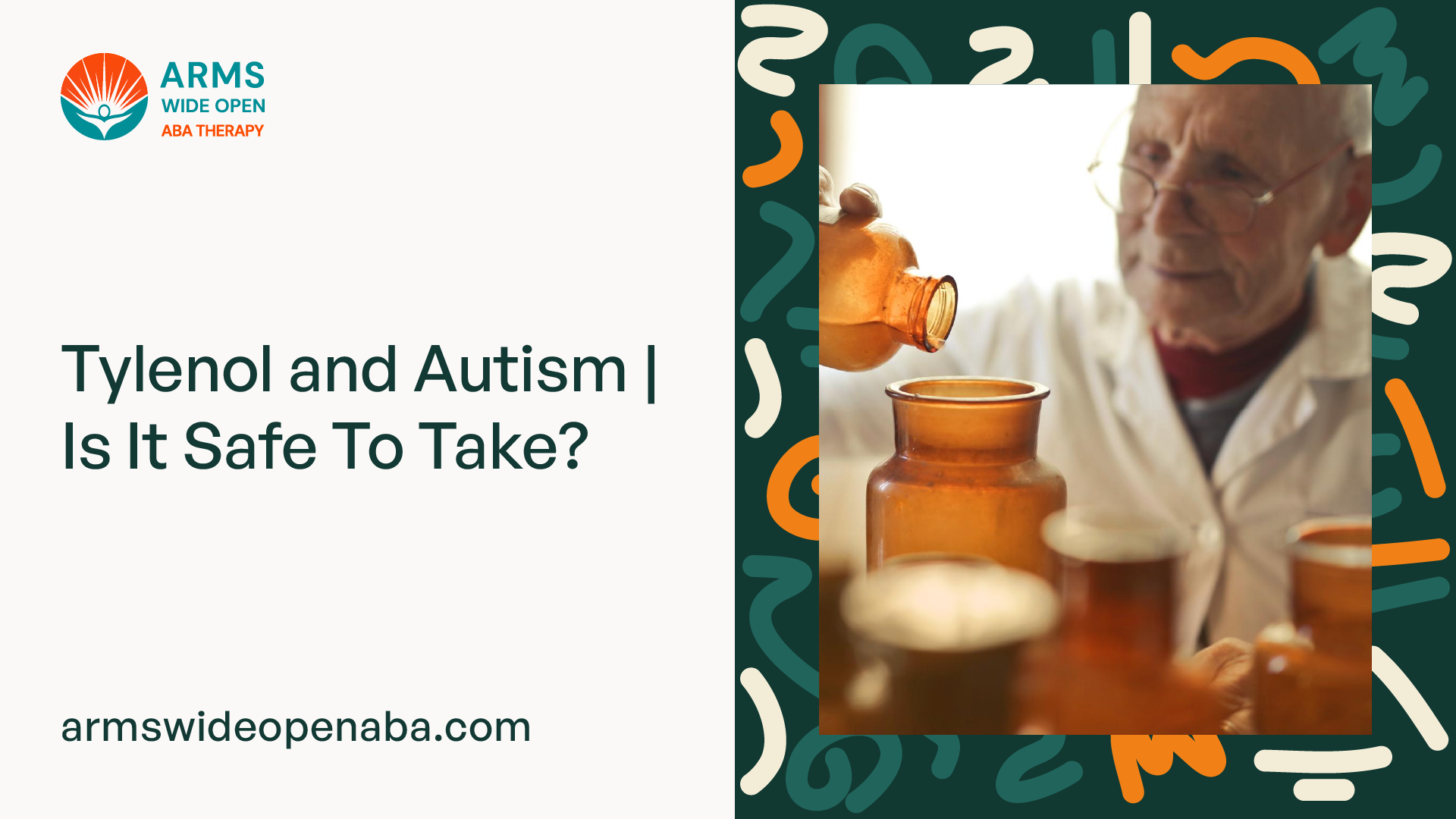Tylenol and Autism | Is It Safe To Take?
Unveiling the truth: Is Tylenol safe for autism? Expert insights, scientific research, and informed decision-making.

Understanding Tylenol and Autism
To fully grasp the controversy surrounding Tylenol and its alleged relationship with autism, it's essential to have a clear understanding of both Tylenol and Autism Spectrum Disorder (ASD).

Brief Overview of Tylenol
Tylenol, also known by its generic name acetaminophen, is a widely used over-the-counter pain reliever and fever reducer. It belongs to a class of drugs called analgesics, which provide temporary relief from mild to moderate pain. Tylenol is commonly used to alleviate headaches, muscle aches, toothaches, and fevers. It is available in various forms, including tablets, capsules, liquid, and suppositories.
Over the years, Tylenol has been extensively studied and considered safe when used as directed. However, concerns have arisen regarding its potential association with Autism Spectrum Disorder.
Introduction to Autism Spectrum Disorder
Autism Spectrum Disorder (ASD) is a neurodevelopmental condition characterized by difficulties in social interaction, communication challenges, and repetitive behaviors. ASD affects individuals differently, with symptoms ranging from mild to severe. It is a complex disorder with a wide spectrum of presentations.
ASD typically appears in early childhood, and its exact causes are still being researched. Many factors, including genetic, environmental, and neurological influences, are believed to contribute to the development of ASD. However, the precise mechanisms and triggers are not fully understood.
It is essential to note that there is no cure for ASD, but early intervention and appropriate support can significantly improve the quality of life for individuals with ASD.
By understanding the basics of Tylenol and Autism Spectrum Disorder, we can delve deeper into the controversy surrounding the alleged link between the two. It is crucial to approach this topic with an open mind and examine the scientific research to gain a clearer perspective on the matter.
The Controversy
When it comes to the relationship between Tylenol and autism, there has been ongoing controversy and debate. Some individuals have raised concerns about a potential link between Tylenol use and the development of autism spectrum disorder (ASD). In this section, we will explore the alleged link and examine the scientific research surrounding this topic.
The Link Between Tylenol and Autism
A hypothesis suggesting a connection between Tylenol use during pregnancy or early childhood and an increased risk of autism has gained attention in recent years. The theory proposes that the active ingredient in Tylenol, acetaminophen, may play a role in the development of ASD. However, it's important to note that this link has not been definitively proven.
Examining the Scientific Research
Numerous studies have been conducted to investigate the potential association between Tylenol and autism. These studies have examined the use of acetaminophen during pregnancy as well as in infancy and childhood. Let's take a closer look at the findings:
Research on Acetaminophen Use during Pregnancy
Several studies have explored the use of acetaminophen during pregnancy and its possible connection to autism. While some studies have reported a slight association between prenatal acetaminophen use and an increased risk of ASD, the findings are not consistent across all studies. It's important to recognize that these studies often rely on self-reported data and retrospective analysis, which can introduce limitations and potential biases.

Studies on Acetaminophen Use in Infancy and Childhood
Research has also explored the use of acetaminophen in infancy and childhood and its potential impact on autism risk. Similar to the studies on prenatal use, the findings are mixed. Some studies have reported a weak association between early acetaminophen use and an increased likelihood of ASD, while others have found no significant link.

Reviewing the Findings
While some studies suggest a potential association between Tylenol use and autism, it's important to interpret these findings with caution. The scientific research on this topic is complex and often yields conflicting results. Additionally, correlation does not necessarily imply causation, and other factors may contribute to the development of ASD.
It is crucial to consider the limitations of the studies, the variability of the findings, and the overall consensus within the scientific community. Further research is needed to establish a clear and definitive link between Tylenol and autism, if any.
In the next section, we will explore expert opinions and recommendations from medical professionals to provide a more comprehensive understanding of the safety of Tylenol use in relation to autism.
What the Studies Say
To understand the potential link between Tylenol and autism, it is important to examine the findings from scientific studies. Research has focused on two key areas: acetaminophen use during pregnancy and acetaminophen use in infancy and childhood.
Research on Acetaminophen Use during Pregnancy
Several studies have investigated the association between acetaminophen use during pregnancy and the risk of autism in children. These studies have involved large sample sizes and rigorous methodologies to gather reliable data.
A study published in JAMA Pediatrics in 2016 analyzed data from a Norwegian population-based cohort. The researchers found a modest association between prenatal acetaminophen exposure and autism spectrum symptoms in boys but did not find a similar association in girls. However, it's important to note that this study did not establish a cause-and-effect relationship.
Another study published in JAMA Psychiatry in 2019 examined the association between maternal acetaminophen use during pregnancy and the risk of autism in offspring. The researchers analyzed data from the Finnish Prenatal Study of Autism, which included over 70,000 children. They found no evidence of a significant association between prenatal acetaminophen exposure and autism spectrum disorder.
Studies on Acetaminophen Use in Infancy and Childhood
Research has also explored the potential effects of acetaminophen use in infancy and childhood on the development of autism. These studies have aimed to determine whether there is a direct link between the two.
A study published in JAMA Pediatrics in 2017 investigated the association between early-life acetaminophen exposure and the risk of autism and attention-deficit/hyperactivity disorder (ADHD). The researchers analyzed data from a large population-based cohort in Denmark. They found no significant association between acetaminophen exposure in infancy and the development of autism or ADHD.
Another study published in JAMA Network Open in 2020 examined the association between acetaminophen use in early childhood and the risk of autism spectrum disorder. The researchers conducted a systematic review and meta-analysis of existing studies. Their findings suggested a weak association between early-life acetaminophen exposure and the risk of autism, but the evidence was limited and further research is needed to establish a causal relationship.
Reviewing the Findings
When reviewing the findings from these studies, it is important to consider the limitations and complexities of the research. While some studies have suggested a potential association between acetaminophen use and autism, the evidence is not conclusive. The majority of studies have not found a significant link, and even those that have reported a weak association emphasize the need for further investigation.
It's crucial to note that correlation does not imply causation. The studies conducted so far have not been able to establish a direct cause-and-effect relationship between Tylenol (acetaminophen) use and the development of autism. It is essential to consult with healthcare providers and consider individual circumstances when making decisions about medication use during pregnancy or for infants and children.
Expert Opinions and Recommendations
When it comes to understanding the safety of Tylenol in relation to autism, it's essential to consider the opinions and recommendations of medical professionals. These experts play a crucial role in providing insights based on scientific research and clinical experience.
Statements from Medical Professionals
Medical professionals, including doctors, researchers, and organizations, have weighed in on the topic of Tylenol and its potential connection to autism. While opinions may vary, the consensus among medical experts is that there is currently no substantial evidence to support a direct link between Tylenol use and the development of autism spectrum disorder.
Many medical professionals emphasize that correlation does not imply causation and stress the importance of relying on evidence-based research. They encourage individuals to consult with healthcare providers and make informed decisions based on accurate information.
Guidelines for Acetaminophen Use
Various medical organizations have established guidelines and recommendations regarding the use of acetaminophen, the active ingredient in Tylenol, in different populations, including pregnant women and children.
Acetaminophen Use during Pregnancy
The American College of Obstetricians and Gynecologists (ACOG) states that acetaminophen is considered safe for use during pregnancy when taken at recommended doses. However, it's important to consult with a healthcare provider before taking any medications during pregnancy.
Acetaminophen Use in Infancy and Childhood
The American Academy of Pediatrics (AAP) provides guidelines for the appropriate use of acetaminophen in infants and children. They recommend using the lowest effective dose for the shortest duration necessary and following the dosing instructions provided by healthcare professionals or the medication label.
It's worth noting that these guidelines focus on the general use of acetaminophen and do not specifically address its connection to autism. The recommendations are based on the overall safety profile of acetaminophen and the available scientific evidence.
By considering the statements from medical professionals and following the established guidelines, individuals can make informed decisions about the use of Tylenol or acetaminophen. It's essential to consult with healthcare providers, who can provide personalized advice based on an individual's specific circumstances and medical history.
Making Informed Decisions
When it comes to the safety of Tylenol and its potential association with autism, making informed decisions is crucial. Consulting with healthcare providers, weighing the risks and benefits, and considering personal factors are essential steps in determining the best course of action.
Consulting with Healthcare Providers
If you have concerns about the safety of Tylenol and its potential impact on autism, it is recommended to consult with healthcare providers. They can provide personalized guidance based on your specific situation and medical history. Healthcare providers, such as doctors and pediatricians, are well-equipped to address your questions and provide accurate information regarding the use of Tylenol and its potential risks.
Weighing the Risks and Benefits
When considering the use of Tylenol, it's important to weigh the risks against the benefits. While studies have explored the potential association between Tylenol and autism, the scientific evidence remains inconclusive. Understanding the potential risks and benefits can help you make an informed decision.
To better understand the risks and benefits associated with Tylenol, it is advisable to review the available scientific literature and consult with healthcare professionals. They can provide valuable insights into the potential risks and benefits based on your individual circumstances.
Personal Considerations and Individual Choices
Ultimately, the decision regarding the use of Tylenol should be based on personal considerations and individual choices. Factors such as the severity of symptoms, alternative treatment options, and personal preferences can influence the decision-making process.
Considering your unique circumstances, personal values, and beliefs is crucial when making decisions about healthcare. It is important to recognize that every individual's situation is different, and what may work for one person may not necessarily work for another.
By consulting with healthcare providers, weighing the risks and benefits, and considering personal factors, you can make informed decisions regarding the use of Tylenol and its potential association with autism. Remember, healthcare decisions should always be made in collaboration with medical professionals to ensure the best possible outcome for your health and well-being.
Sources
https://www.drugwatch.com/drugs/tylenol/tylenol-and-autism/
https://www.spectrumnews.org/news/scientists-debate-evidence-linking-acetaminophen-to-autism-adhd/
https://health.clevelandclinic.org/pregnancy-does-acetaminophen-heighten-risks-for-autism-adhd
Similar articles
We’re here to help you

Our team is here to assist you in this process. Contact us for any assistance.
it’s easy to apply
We Accept Most Insurances
Our in-network insurance partnerships make ABA therapy more accessible to families throughout our service areas.







Our Insurance Process
We'll request your insurance details to help us verify your plan's coverage for ABA therapy. Once we've received this information, we'll walk you through your benefits, including copayments, deductibles and out-of-pocket maximums, so you know what to expect in advance.
Our team will then handle the preauthorization and all the necessary paperwork.
.svg)





















.jpeg)


































.jpeg)




.jpeg)







.jpeg)











.jpeg)
















